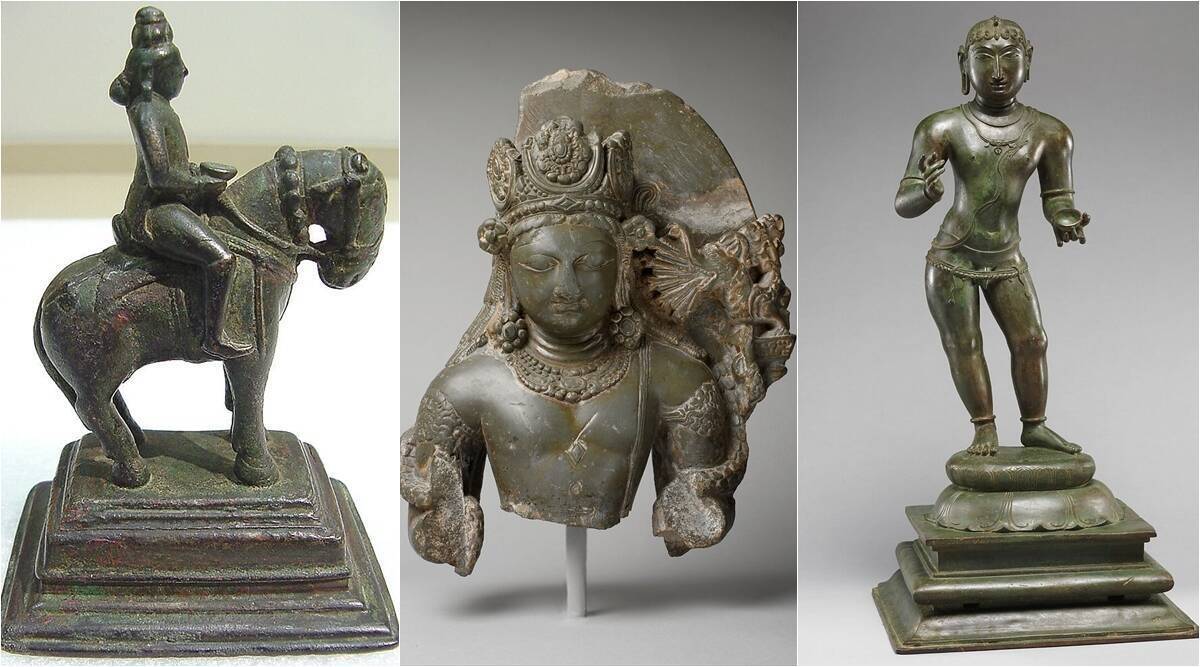India’s Culture Secretary Govind Mohan, briefing reporters Sunday on the third G20 Culture Working Group meeting in Hampi, said this is the first lot of antiquities that the Met has willingly agreed to return to India.
These will be among the 150 antiquities that will return to India from the US in 3-6 months, he said, adding that besides the 15 objects returned by the Met, the others are those confiscated by US authorities and kept in the office of the New York Attorney General. “We are making efforts to have our team go there, verify them and bring them back,” Mohan said.
According to an investigation in March by The Indian Express, in association with the International Consortium of Investigative Journalists (ICIJ) and the UK-based Finance Uncovered, a treasure trove at the Met was traced to antique dealer Subhash Kapoor who is serving a prison term in Tamil Nadu for smuggling antiquities.
On March 30, the Met issued a statement saying it would “transfer 15 sculptures for return to the government of India, after having learned that the works were illegally removed from India”. It said “all of the works were sold at one point by Subhash Kapoor, a dealer currently serving a prison sentence in India.”
Of the 15 items listed in the search warrant, 10 were flagged in The Indian Express report. Significant among these are the Celestial Dancer, a 1st century BCE Yakshi terracotta from West Bengal; a bronze sculpture of God Revanta Returning from the Hunt (10th century CE); and a 15th century Parikara (Backplate).
The other works that are set to return to India include antiquities in different mediums such as marble, terracotta and sandstone, span a period of 1,600 years, from the 1st century BC to the 15th century AD, and hold significant historical and market value, officials said.
Restitution of cultural heritage is among the main themes of the cultural track under India’s G20 Presidency. The 1970 UNESCO Convention enjoins upon all the signatories to voluntarily return all the artefacts that have either been taken there due to colonial plunder or post-colonial misappropriation through smuggling, theft or other such means, Mohan said.
“The 1970 convention has been discussed extensively among all the countries and there are some countries who are not signatories so far. We are trying to develop a broad consensus that at least all the G20 countries become signatories to the convention. India would be a big gainer from this process,” he said.

India is pursuing agreements pertaining to the return of antiquities through both bilateral and multilateral routes. According to the Cultural Property Agreement signed between India and the US, which found mention in the joint statement after Prime Minister Narendra Modi’s State visit last month, “the US will do all that is within its power to intercept smuggled goods at the border and return them expeditiously”.
“With the US having accepted this kind of a framework, we are hopeful that the other countries will also look at something similar, if not identical,” Mohan said, adding that presently, India is pursuing bilaterally for such agreements with the United Kingdom, France, Italy and Australia.
As many as 50 delegates are attending the third CWG meeting, including those from member countries, guest nations and multilateral organisations. Progress has been made towards bridging opinions during deliberations and arriving at a consensus, Mohan said.
